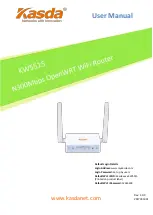
Port forwarding to a local server
If your business network includes a server, you can allow certain types of incoming traffic
to reach the server. For example, you might want to make a local web server, FTP server,
or game server visible and available to the Internet.
The router can forward incoming traffic with specific protocols to computers on your
local network. You can specify the servers for applications and you can also specify a
default DMZ server to which the router forwards all other incoming protocols.
Set up port forwarding to a local server
To forward specific incoming protocols:
1. Decide which type of service, application, or game you want to provide.
2. Find the local IP address of the computer on your network that will provide the
service.
The server computer must always use the same IP address. To specify this setting,
use the reserved IP address feature. See Reserved LAN IP addresses on page 121.
3. Launch a web browser from a computer or mobile device that is connected to your
Orbi network.
4. Enter orbilogin.com.
A login window displays.
If your browser does not display a login window but displays a security warning and
does not let you proceed, see What to do if you get a browser security warning on
page 28.
5. Enter the admin user name and password.
The user name is admin. The password is the one that you set the first time that you
logged in. The user name and password are case-sensitive.
The BASIC Home page displays.
6. Select ADVANCED > Advanced Setup > Port Forwarding/Port Triggering.
The Port Forwarding/Port Triggering page displays.
7. Leave the Port Forwarding radio button selected as the service type.
8. In the Service Name menu, select the service name.
If the service that you want to add is not in the list, create a custom service. See Add
a custom port forwarding service on page 186.
User Manual
185
Customize Internet Traffic Rules
for Ports
Orbi Pro WiFi 6 AX5400 Router Model SXR50 and Orbi Pro WiFi 6 AX5400 Satellite Model SXS50
















































